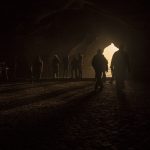In the final paragraph of Mere Christianity, C.S. Lewis exhorts his reader, “Give up yourself, and you will find your real self. Lose your life and you will save it. Submit to death . . . and you will find eternal life.”
To move toward our desired destination, we must often set off in what seems to be the opposite direction. Columbus sailed west in search of the East, nations fight wars to preserve peace, and blessed and honored are those counted least. The often astute Marxist-Leninists were aware of this reality, which they called the dialectic. They gave land to peasants in the pursuit of property’s abolition, and they often retreated in order to advance upon their enemy at a later time. Children in the Soviet Union were even taught to dance the dialectic, taking two steps forward and one step backward to symbolize their cult’s plan for world domination. Yet for the disciples of Karl Marx, the glorious paradise that was supposed to result from their vicious, violent strategy never came to be. They promised man heaven and bequeathed him hell.
My purpose in this essay is not to deal with questions of politics and parties, with the problems of presidents and prime ministers—at least not directly. Just as we cannot find ourselves unless we give ourselves up, just as Columbus set off for the Western hemisphere when his destination was in the Orient, so too must we push off toward a world outside the political arena if we wish one day to set our civilization right-side up. If an American wishes to change the way his society functions, it seems natural for him to go to Washington: elect the right people, pass the right laws, and we will have relative peace, order, and harmony. Yet it is neither conservative nor biblical to seek social salvation in the laws of the land. Although the conservative and the Christian certainly have much to say about how a society should be organized and laws formed, we must remember that God will not be used as a convenience. It is no good for us to try to use Christianity to fix our country when we have yet to let ourselves be fixed by God.
Into the Wardrobe
Start your day with Public Discourse
Sign up and get our daily essays sent straight to your inbox.Good government is a byproduct of a good people. Although they put structural elements in place to combat man’s self-interest, America’s founders saw republican self-government as contingent on a godly, upright, virtuous population that was willing to serve the common good.
We must first turn to the task of making sick men well and dead men come to life if our country’s capital is finally to be fixed. Man is not perfectible on earth, and sin will always be with us. But it never hurt a soul to be a little braver, a little humbler, or a little kinder—and great literature can help inspire us to work to embody these virtues more fully.
The title of this essay really ought to be “Into the Wardrobe, Out of the Cave,” for it is into great literature that we must first go if we want to gain a greater glimpse of our own lives. In alluding to The Lion, the Witch, and the Wardrobe, I have in mind the natural experience of being drawn out of ourselves and into a really great story when we flip through the pages of the world’s greatest books. The best authors have an uncanny ability to make us feel as if we are actually in the worlds they create. We find ourselves having tea with Mr. Tumnus in a Narnian wood, we sit with Harry Potter in the high towers of Hogwarts Castle, and we, with Juliet, have our hearts broken when we awake to see Romeo dead on a cold stone floor.
There is something magical about being transported into another dimension with our favorite casts of characters. As readers, we are given the privilege of bringing to life within our minds the world that the author has woven together in his. But it is not only fun, it is important. When we read great stories, we grow to genuinely care about the people that we meet. It is quite important to us that Aslan not be dead forever, that Frodo make it to Mount Doom, that Caspian escape from murderous Miraz and live to fight another day. And if we really care, then the author has succeeded, because an objective of literature is to make readers come out of themselves.
Every true moral code is based on the idea that we should love other people, and genuine love requires that we place others before ourselves in selfless sacrifices both large and small. It is hard to be selfish when we care deeply about other people, and it is hard not to care deeply about other people when we continually find ourselves in the middle of a good book.
Out of the Cave
While the first task of great literature is to capture our hearts and pull us in, the second is to give us eyes to see and ears to hear, to bring us out of the cave. In his famous Allegory of the Cave, Plato wrote that men, in their natural state, are chained to the floor of a cave and are only capable of seeing the shadows that dance on the wall in front of them. But every so often, a man is able to break free of his chains and head toward the cave’s exit. Before he emerges, he first sees figures dancing in front of a fire at the cave’s mouth. It is the shadows of these men that most people see on the cave wall. These men are the reality behind the shadows. Yet behind these men, outside the cave, is the sun. The sun is the true source of light, and the one who breaks his chains and heads for the surface soon understands that there is so much more to the world than he ever could have imagined when he sat in bondage before the smoky silhouettes of the cavern walls.
The Allegory of the Cave points us to the bigger picture that lies beyond our own small perceptions of reality. Great literature seeks to do the same. In the pages of King Lear, we encounter the concepts of justice and truthfulness. In Macbeth, we are confronted with the disastrous effects of an all-consuming lust for power. In The Count of Monte Cristo, we are left to deal with questions of vengeance and reprisal. These themes do more than just form the philosophical bases for their stories; they are critical to our own lives because they represent beams from the sun that lie outside the cave of our everyday lives. By reading great books, we learn to love what is good and to hate what is evil. We learn to recognize both righteousness and unrighteousness.
Lewis referred to the setting of our lives as the Shadowlands, and sometimes the shadows themselves make it difficult for us to see the blazing light that shines in all its glory behind the clouds. Literature is at its best when it shows us a glimpse of sunlight in another world so that we may see more clearly in our own. Perhaps nowhere is this concept made clearer than in Aslan’s final exhortation in The Voyage of the Dawn Treader. Upon being asked whether or not he is in the Pevensies’ own world too, the Great Lion responds “I am. . . . But there I have another name. You must learn to know me by that name. This was the very reason why you were brought to Narnia, that by knowing me here for a little, you may know me better there.”
The Implications of Good Storytelling
The easiest test of a work’s true power is to ask whether or not it pulls us into the wardrobe and propels us out of the cave. The stories and sonnets that excel at these two tasks will undoubtedly dwell within the hearts and minds of men throughout the twenty-first century and beyond, evidencing their transformative power in generation after generation. It is difficult to habitually read great stories and not become humbler, more reverent, and more virtuous.
Now, in a roundabout way, we end up back at the very things I ignored earlier: politics, parties, presidents, and prime ministers. Societies are collections of individuals living together in community and simultaneously pursuing personal as well as common objectives. Thus, anything that makes an impact on particular people will have an effect on their societies as well. There is a good chance that the side effects of our formative literary experiences may ultimately be a healthier political discourse, a wiser body of statesmen, and a law code that aims at true justice. The healthier the roots and stem of a flower, the greater the chance that the petals will bloom beautifully in the spring. So it is with politics. All of our noblest political goals are the blossoming petals of a civilizational flower. The West may be too weak and too malnourished to produce such delicate splendor this season, but if more and more people developed green thumbs, we may save the garden yet.
If our love for reading results in a healthier world, so much the better. But the true magic of the written word is most evident when the lives of individuals are changed. The books that nurture our virtues may one day lead us to the other side of the world to help impoverished orphans, or they may one day drive us to reach out to a neighbor in need. But perhaps a great book may have the simple yet profound effect of filling us with just a little more joy or just a little more love. Inspired by them, perhaps we might not mind doing the dishes for our parents, cleaning up after our kids, or finishing an assignment for our employer quite as much as we did the day before.
It is our desire to do the littlest things with a renewed sense of purpose, joy, and love that serves as the clearest evidence that the worst parts of ourselves are dying and the best are coming to life. If an author has inspired us to vacuum the carpets, wash the windows, or buy the groceries with brighter smiles on our faces, then he has done something truly wonderful.













